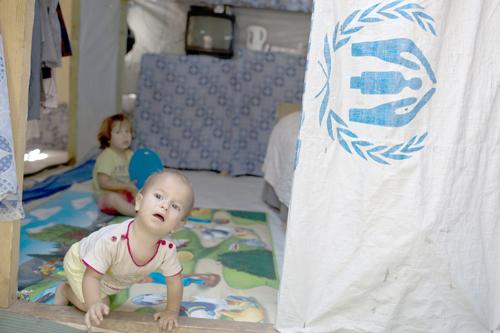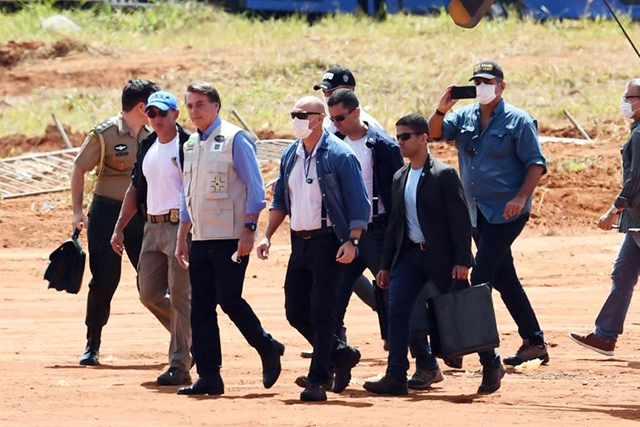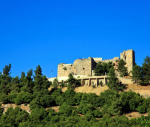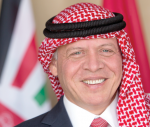You are here
Syrian refugees welcomed in Brazil but face tough times
By Thomson Reuters Foundation - Jul 17,2016 - Last updated at Jul 18,2016

Syrian children play inside a tent at Ritsona Refugee Camp, north of Athens, which hosts more than 600 refugees and migrants, on Thursday (AP photo)
RIO DE JANEIRO — When Hanan Dacka fled the civil war in Syria with her family to start a new life in Brazil, the idea that she might one day carry the Olympic torch was beyond the stretch of anyone's imagination.
At first, she struggled to settle into school, not knowing how to speak Portuguese. Her family lived, and still lives, in a cramped one-bedroom apartment in Sao Paulo. Her brother works seven days a week in a shop.
Yet the 12-year-old girl ran with the Olympic flame in Brasilia in May, the first day of its journey through more than 300 towns and cities. The Summer Olympic Games begin on August 5 in Rio de Janeiro.
She was chosen by the Rio 2016 Organising Committee after her name was put forward by the UN refugee agency in Brazil.
Her high-profile Olympics role put a spotlight on the lives of refugees who have settled in Brazil, which is deep in the throes of recession.
Brazil's economy is expected to contract nearly 4 per cent this year, for a second consecutive year. Economists' forecasts suggest a downturn of a magnitude not seen since Brazil began keeping records in 1901.
Refugees like the Dacka family are finding it hard to land permanent jobs and get state support to settle in.
"The labour market conditions in general are terrible, especially for those who are looking for jobs now, especially for those who don't have the skills," Rudi Rocha, an economics professor at the Federal University of Rio de Janeiro, told the Thomson Reuters Foundation.
"For this reason, the situation for those who are arriving in Brazil, the immigrants, the refugees in particular, is complicated," he said.
A wave of refugees who began arriving to Brazil a few years ago was met with a steadier economy and greater job prospects, he said.
Today's refugees may find only informal, temporary positions in the services and retail sectors, he said.
Some 2,100 Syrian refugees live in Brazil, mostly in the country's most populous city of Sao Paulo.
Hanan Dacka said when she arrived, her classmates did not know what it meant to be a refugee and she stumbled in her schoolwork.
"I could not follow the pace," she told the Thomson Reuters Foundation. "It was a surprise for me to hear a different language here."
Welcoming
Brazil, the region's largest country, receives more Syrian refugees than any other country in Latin America.
Starting in 2013, Brazil issued special visas under simplified procedures to allow survivors of the war in Syria to travel to the country, where they can claim asylum.
Last year Brazil signed a deal with the European Union to fast-track Syrian immigration to help some of the millions who have fled their homes in the deadly conflict, now in its sixth year.
The Dacka family arrived to Brazil just over a year ago, fleeing Syria for Jordan where they spent two-and-a-half years at a refugee camp, according to the UN refugee agency UNHCR which provided details of their lives.
The family applied for visas through the Brazilian embassy in Amman.
Now they live with the girl's uncle, aunt and four cousins in an apartment shared by 11 family members in all.
Hanan's father, Khaled Dacka, worked at a currency exchange office in Syria and is a factory worker in Sao Paulo, making car parts. Her mother Yusla Dacka is a housewife.
"For any refugee, especially for those coming from the Middle East, they have a cultural shock," Luiz Fernando Godinho, a spokesman for the UNHCR, told the Thomson Reuters Foundation.
Refugees in Brazil face falling wages as well as rising unemployment.
Average monthly wages in April dropped by more than 3 per cent from a year earlier to an average of 1,962 reais ($604), according to the state-run Brazilian Institute of Geography and Statistics.
Joblessness rose to 10.9 per cent in the first quarter of this year, compared with 7.9 per cent a year earlier, the Institute said.
Water and healthcare
The outlook is sobering, with unemployment predicted to rise until at least 2018.
"For poor refugees, particularly if they don't have any help from a migrant community that is already here, it is really tough," said Oliver Stuenkel, assistant professor of International Relations at the Sao Paulo-based Getْlio Vargas Foundation.
Refugees can expect little in the way of healthcare, which many Brazilians only receive through private means, and services such as sewage and water, he said.
"Half of Brazilians don't have a functioning sewage system; they don't have proper running water. You can't really say that the state should provide that to refugees without any money because then it would be providing better services to refugees than to its own population," Stuenkel said.
Overall, the Brazilian state has "very little capacity" to help integrate new refugees, Stuenkel said.
However, a lack of anti-immigrant sentiment in Brazil does make it an attractive option, he said.
Related Articles
RIO DE JANEIRO — Dr.aldilea Veloso is racing against time: she needs ventilators, face masks and medical staff before the coronavirus outbre
The two sides of being FIFA President Sepp Blatter are on display just before the troubled World Cup kicks off on June 12, acclaimed by world football leaders but held in contempt by many football fans.
SAO PAULO — Brazilian gymnast Angelo Assumpcao still wonders how far he could have gone if not for the decision he says derailed his career:


















